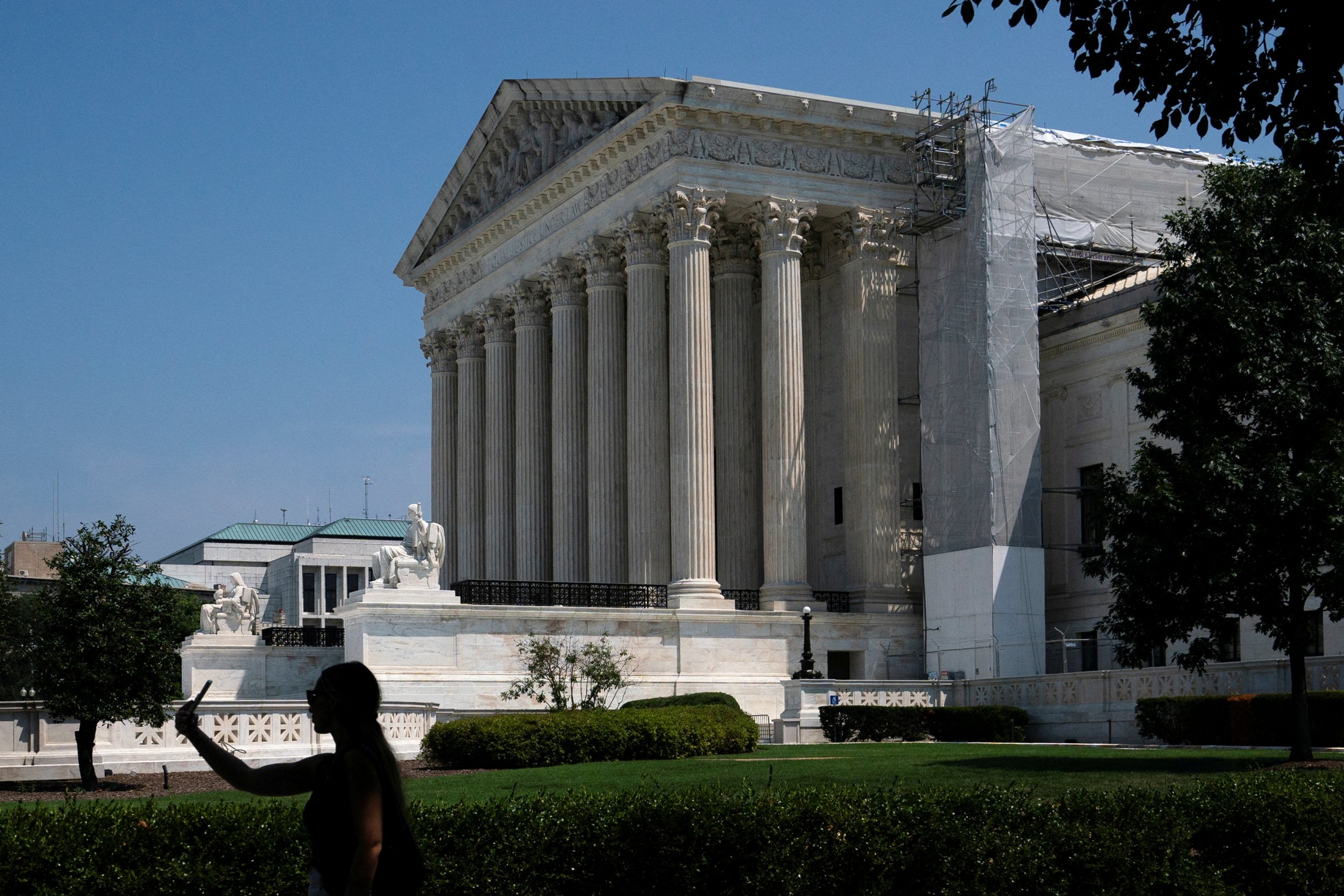WASHINGTON—The Supreme Court on Friday rejected a Biden administration request to implement its overhaul of regulations barring sex discrimination in education, leaving in place temporary injunctions lower courts issued that put on hold new protections for transgender students, along with other provisions.
A five-justice majority issued an unsigned order saying the administration hadn’t justified the high court’s intervention at this stage in the litigation, but noted that a federal appeals court had set an expedited schedule to consider the case, which pits Republican-led states opposed to expanding recognition of transgender students against Biden administration policy that seeks to expand protections for them.
Four justices agreed that three provisions of the challenged regulations should remain blocked while the litigation continues. But they said the majority should have let the rest of the regulations, which implement the landmark law known as Title IX, go into effect.
“Many unchallenged provisions (such as those governing preemployment inquiries about an applicant’s marital status or sex and prohibiting pregnancy discrimination) include no reference to gender identity discrimination,” Justice Sonia Sotomayor wrote in a partial dissent, joined by fellow liberal Justices Elena Kagan and Ketanji Brown Jackson , as well as Justice Neil Gorsuch , a conservative who in 2020 wrote the court’s opinion extending civil rights protections to LGBT employees.
The majority, however, agreed with lower courts that found it impossible to separate the new provisions focusing on transgender students from the rest of the regulations.
“The new definition of sex discrimination is intertwined with and affects many other provisions of the new rule,” said the majority, which included Chief Justice John Roberts and Justices Clarence Thomas , Samuel Alito , Brett Kavanaugh and Amy Coney Barrett . “At least at this preliminary stage,” they said, “the allegedly unlawful provisions are not readily severable from the remaining provisions.”
In April, the Education Department announced new regulations updating the implementation of Title IX, passed in 1972 to end sex-based discrimination in educational programs receiving federal assistance. The update included rules prohibiting discrimination based on gender identity, entitling transgender students to use locker rooms and lavatories according to their gender identity, and specifying that safeguards against sex-based harassment included gender identity, among other provisions in the 423-page document.
“The final regulations promote educational equity and opportunity for students across the country as well as accountability and fairness, while empowering and supporting students and families,” the department said when unveiling the update, which had been slated to take effect Aug. 1.
While the Biden administration has pushed to expand protections for transgender students, Republican-led states have moved in the opposite direction. Half the states, largely in the South and Great Plains, have adopted measures restricting participation in youth sports to teams of the same biological sex, therefore prohibiting transgender students from joining teams reflecting their gender identity.
“I am grateful that the Supreme Court of the United States agreed that no part of the Biden administration’s Title IX rule should go into effect while the case proceeds,” said Tennessee Attorney General Jonathan Skrmetti, a Republican who spearheaded one of the challenges. “This is a win for student privacy, free speech, and the rule of law.”
The 2024 Republican Party platform criticizes “left-wing gender insanity” and declares that GOP candidates, including former President Donald Trump , would “reverse Biden’s radical rewrite of Title IX Education Regulations, and restore protections for women and girls.”
Opponents of the transgender-student protections sued to block the regulations, and several courts issued temporary orders partially blocking them while litigation proceeds.
“There are two sexes: Male and female,” a federal district judge in Covington, Ky., Danny Reeves, wrote in one such case, in a June decision blocking implementation of the regulations in Tennessee, Kentucky, Ohio, Indiana, Virginia and West Virginia. While Title IX prohibited sex discrimination in “academic courses or programmatic offerings, scholarships, athletic opportunities, and other matters,” Reeves noted that the law allows certain activities traditionally segregated by sex to continue. Those include single-sex schools and dormitories, as well as fraternities and sororities, scouting groups, and organizations such as the YMCA and YWCA, he wrote.
The Biden administration said its approach was in line with a 2020 Supreme Court decision, Bostock v. Clayton County, which extended sex-discrimination protections of the 1964 Civil Rights Act to transgender employees . In Bostock, two conservatives—Gorsuch and Roberts—joined the four liberals then on the court in a 6-3 decision for LGBTQ employees.
“It is impossible to discriminate against a person for being homosexual or transgender without discriminating against that individual based on sex,” Gorsuch wrote in that case. Although dissenting justices suggested the decision would affect hundreds of other federal antidiscrimination laws, Gorsuch stressed the court was leaving disputes over locker rooms and the like for another day.
The Biden administration regulations, however, might bring that day closer.
“Just as Bostock holds that an employer cannot fire or discriminate against an employee simply for being transgender, [the Title IX update] clarifies that a school cannot expel or otherwise discriminate against a student simply for being transgender,” Solicitor General Elizabeth Prelogar said in court papers.
The states argue that regardless of Bostock, the Education Department skirted procedural requirements for issuing regulations, making the new protections invalid.
But taking the matter head-on, the states say that a general protection of transgender people from discrimination shouldn’t extend to certain situations that have long been segregated by sex.
“Longstanding regulations allow sex separation in bathrooms and sports,” Tennessee argued. If the Biden administration’s position is right, “then sex-separated bathrooms and sports violate the statute too—and always have.”
Write to Jess Bravin at Jess.Bravin@wsj.com



